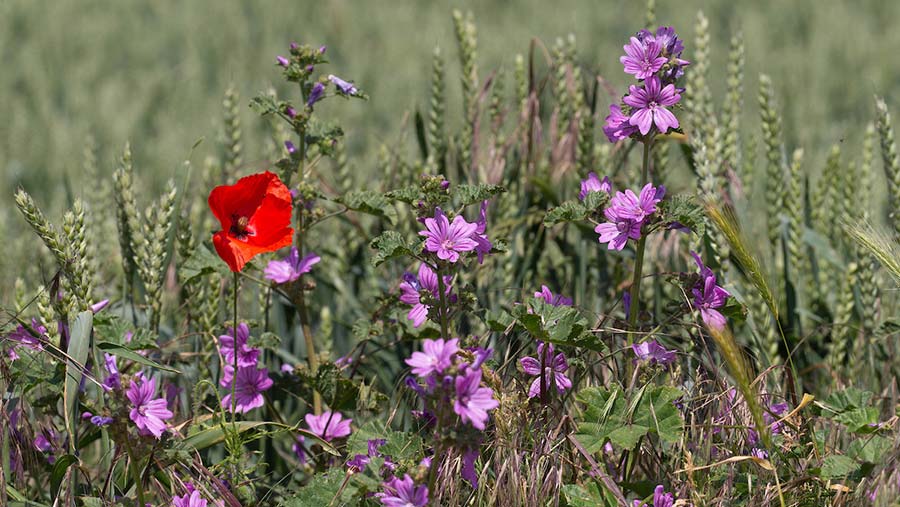Industry welcomes SFI expansion, but food production fears remain
 © Tim Scrivener
© Tim Scrivener Farm leaders have welcomed Defra’s significant expansion of the Sustainable Farming Incentive scheme for 2024, but have raised concerns about whether it is compatible with sustainable food production.
Defra secretary Steve Barclay unveiled a massive upgrade to the Sustainable Farming Incentive (SFI) offer for 2024 at the Oxford Farming Conference on Thursday (4 January).
Around 50 new actions have been added to the scheme to be delivered across a range of different farming practices and landscapes, including grassland, moorland, lowland, peat, agroforestry, wood pasture, scrub creation and for upland and common ground.
See also: SFI 2023: The support options for arable growers
The updates include an average 10% funding uplift, streamlined application processes for farmers to apply for the SFI and Countryside Stewardship (CS) Mid Tier, and enhanced environmental incentives and support for the rollout of new technology, such as robotic weeding. SFI 2024 will open this summer.
Speaking at the conference, Mr Barclay said the SFI 2024 offer had been designed using farmers’ feedback.
“We’re making it easier for farmers of every type and size to enter the schemes, and I encourage everyone to take a look at how you can join the thousands of other farmers and land managers who are already receiving our backing,” he said.
Mr Barclay insisted the new-look scheme would also help deliver the government’s commitment for the UK to continue to produce at least 60% of the food it consumes.
Income foregone
The NFU said it welcomed the better range of actions and increased payments under SFI 2024, especially for moorlands and the uplands. But it expressed regret that the payments remain firmly based on income foregone.
NFU vice-president David Exwood questioned whether the scheme and its options will be “compatible or competitive with productive farming”.
The NFU had always supported sustainable food production alongside environmental work, provided that domestic food production levels are at least maintained, Mr Exwood said.
But he added: “It’s not clear what the impact of this [SFI 2024] is. For arable farmers, some of the best paying options are where you take land out of production.”
The NFU is calling on Defra to carry out a mid-term review of Environmental Land Management, to assess whether the viability of food production is still assured.
The expanded SFI offer includes payments for spring/summer cover crops and, although many arable farmers will welcome this option as guaranteed income, it could result in fewer break crops being grown, Mr Exwood warned.
“If oilseed rape and peas and beans are seen as the most vulnerable part of the rotation, will we see them replaced with cover crop options… what is the impact going to be on the amount of pulses or oilseeds grown in this country?”
Nature-friendly
Nature Friendly Farming Network chief executive Martin Lines said Defra had clearly taken on board the views of nature-friendly farmers in its development of the SFI.
“I would urge all farmers to look at the 2023 offer which is currently available and add this 2024 offer as soon as they are available later this year,” he said.
“The funding is there to pay for actions that deliver positive outcomes for food, farming and the environment.”
But Tenant Farmers Association chief executive George Dunn said many members had found the application process for SFI 2023 far from straightforward – and this must be improved.
He fears the Rural Payments Agency’s IT system may not be ready to hit the ground running by the summer with the new options/scheme developments.
New payments on offer under the upgraded SFI
Farmers and land managers whose land suffers from repeated flooding events will be given options to manage water bodies and landscapes under the new-look scheme.
SFI 2024 will include opportunities for farmers to be rewarded for managing flood alleviation areas, or at least receiving payment for changing the use of their land.
Managed features on arable land for flooding and drought resistance on a five-year agreement will pay £1,241/ha. Flood mitigation on arable reversion land pays £740/ha.
A new option for managed grassland for flood and drought resistance and water quality will pay £938/ha once the scheme opens this summer.
There are also new payments for making peatland wetter, including for raising water levels in lowland peatland on a 10-year agreement, worth £892/ha for raising the water table and £1,409 for raised water levels in crop or arable peatland soils near land surface.
Meanwhile, there are four new options for precision farming: variable-rate application of nutrients, camera or remote-sensor guided herbicide spraying, robotic mechanical weeding and robotic non-mechanical weeding. A new payment for no-till farming over three years also offers £72/ha.
